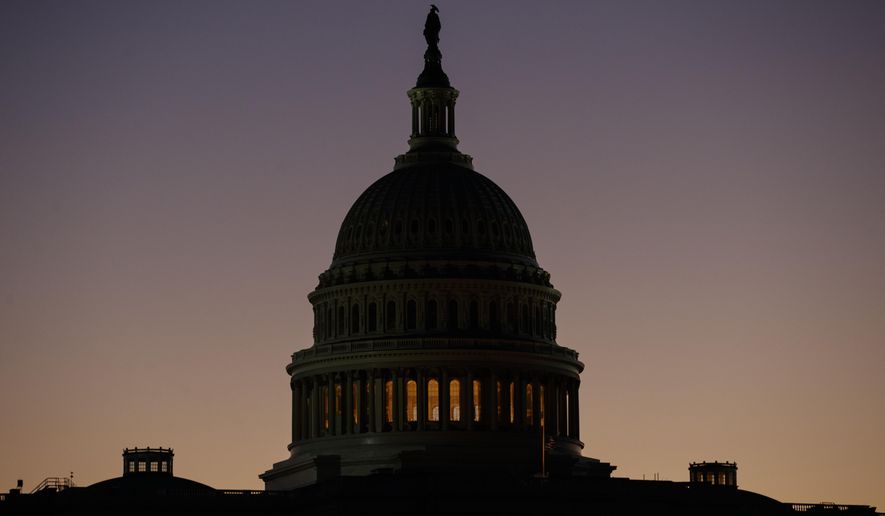OPINION:
Washington has always been a mixture of principle and power, but seldom has the concoction been so explosive. As tumultuous as the past two years have been with Republicans lodged at both ends of Pennsylvania Avenue, the next two with resurgent Democrats commanding the House of Representatives promise to be far coarser. Anticipating the coming clash, Americans are bracing for impact.
The current government shutdown over funding for President Trump’s signature security wall along the nation’s southern border is the most glaring sign of political division. Though the parties are locked in battle over a comparatively paltry $5 billion, the key conflict is not over the cost but whether the president can prevail in fulfilling a central tenet of his leadership: “A nation that cannot control its borders is not a nation.” It’s a catchphrase that Mr. Trump has borrowed from the patriotic expressions of Ronald Reagan. Republicans’ demand for a wall, fence or steel slats — and Democrats’ unyielding opposition to any barrier sturdier than thin air — puts their opposing political principles in stark relief.
It’s unsurprising, then, that a recent Gallup survey found record polarization between the two parties. The average presidential job approval rating that Republicans award to Mr. Trump is a sky-high 85 percent; for Democrats, a leaden 8 percent. The 77-point gap, says Gallup, is “unprecedented.”
Probing further, Gallup found Americans’ top concern is none other than government itself. At 19 percent, “some aspect of government” led all other issues as the foremost cause for worry among those surveyed. It’s more than a little troubling that the very institution tasked with solving the wide range of society’s quandaries has itself become Americans’ No. 1 headache.
Government’s unenviable position at the top of the nation’s naughty list could have something to do with its failure to deal with the next most serious concern — immigration — cited by 16 percent of Gallup’s respondents. In its summary report of fiscal 2018, U.S. Immigration and Customs Enforcement recounted that it made 158,581 administrative arrests of illegals, 66 percent of whom were convicted criminals. Of those, 2,028 had been charged or convicted of homicide, 6,888 were involved in sex offenses, and 80,730 had been charged or convicted of driving under the influence. An additional 5,872 known or suspected gang members and 42 known or suspected terrorists were shown the exit.
While the apprehension of large numbers of illegals with criminal records makes the nation safer, Americans are canny enough to question why so many lawless individuals have been roaming their communities in the first place. After watching for years the game of hide-and-seek between a shadowy population and law enforcement, the answer is as clear as day: Because government — lacking principle, power or both — has been unwilling or unable to halt it.
Witnessing the fight in Congress over the president’s border wall, it doesn’t take a crystal ball to foretell the likelihood that political gridlock will continue to grip Washington like a midwinter snowstorm. A Pew Research Center survey conducted following the midterm elections in November found 61 percent of respondents predicting that Democrats would be unsuccessful in enacting their legislative agenda when the 116th Congress convenes on Jan. 3. Moreover, 63 percent doubted that Mr. Trump would have much luck, either.
A recent USA Today/Suffolk University Poll found that 60 percent of Republicans rank halting illegal immigration as their top priority, and want the president’s pledge to build the wall fulfilled. Democrats’ concerns were more diffuse, with only 37 percent rallying around their top issue — expanding access to health care and reducing health care costs.
If there is one central object of anxiety shared by both parties, it is the Donald himself. Nearly eight in 10 Republicans fear that Democrats in the new Congress will use their freshly acquired power will go overboard with their investigations into all things Trump. As their leaders ready the torches and pitchforks, 56 percent of Democrats fret that the Nancy Pelosi-Chuck Schumer axis of power might leave a Trump stone unturned.
Summing up the president’s first two years, 78 percent of respondents claim the nation is more divided than before, with only 11 percent disagreeing. Before blaming Mr. Trump for the divisive condition of the commonweal, it’s important to recall that the art of pitting interest groups against each other was mastered by Barack Obama, whose polarization gap was only slightly smaller at 70 percent.
Americans preparing to battle one another for political advantage in 2019 would be wise to recall Abraham Lincoln’s blunt warning: “United we stand, divided we fall.”




Please read our comment policy before commenting.